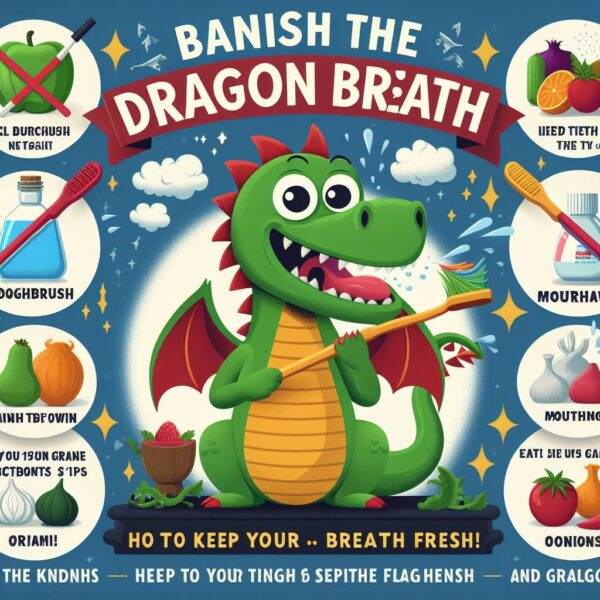
Bad breath, also known as halitosis, is a common but often embarrassing problem that can affect anyone at any time. Whether it’s a lingering odor from a garlicky meal or a more persistent issue, dealing with bad breath can be challenging.
Not only does it impact our self-confidence and social interactions, but it can also be a sign of underlying dental or health issues that need attention. In this article, we’ll explore the causes of bad breath and provide practical tips on how to get rid of it.
From simple changes in oral hygiene habits to addressing potential medical conditions, understanding the root of the problem is crucial for finding effective solutions. So, if you’re tired of feeling self-conscious about your breath or simply want to ensure your oral health is in top shape, read on to discover how to banish bad breath for good.
How To Get Rid Of The Bad Breath
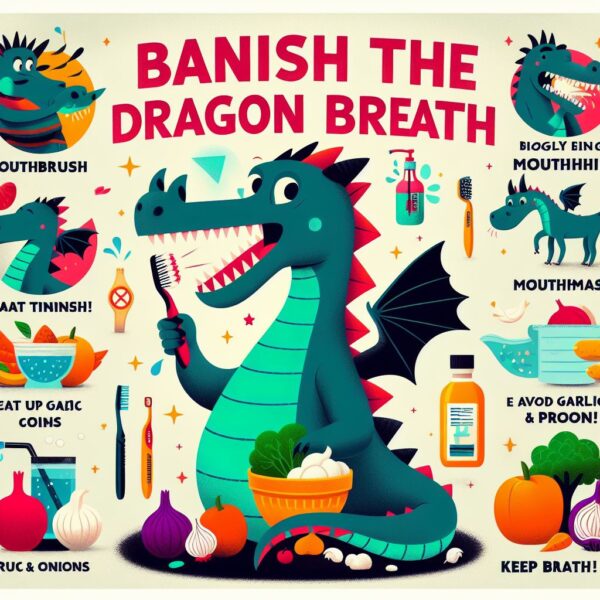
Bad breath, or halitosis, can be a persistent nuisance that affects not only our confidence but also our social interactions. Fortunately, there are several steps you can take to address this issue and regain fresh breath and confidence.
Maintain Excellent Oral Hygiene:
One of the primary causes of bad breath is the buildup of bacteria in the mouth, which can occur due to poor oral hygiene habits. Brushing your teeth at least twice a day and flossing regularly can help remove food particles and plaque that contribute to odor-causing bacteria. Additionally, don’t forget to clean your tongue, as bacteria can accumulate on its surface and contribute to bad breath.
Stay Hydrated:
Dry mouth is another common cause of bad breath, as saliva plays a crucial role in washing away food particles and bacteria. To combat dry mouth, make sure to stay hydrated by drinking plenty of water throughout the day. Chewing sugar-free gum or sucking on sugar-free candies can also stimulate saliva production.
Watch What You Eat:
Certain foods and beverages, such as onions, garlic, coffee, and alcohol, can contribute to bad breath. Limiting your consumption of these items or practicing good oral hygiene immediately after consuming them can help minimize their effects on your breath.
Quit Smoking:
Tobacco products not only stain your teeth but also contribute to bad breath. Quitting smoking is not only beneficial for your oral health but also for your overall well-being.
What Is Bad Breath?
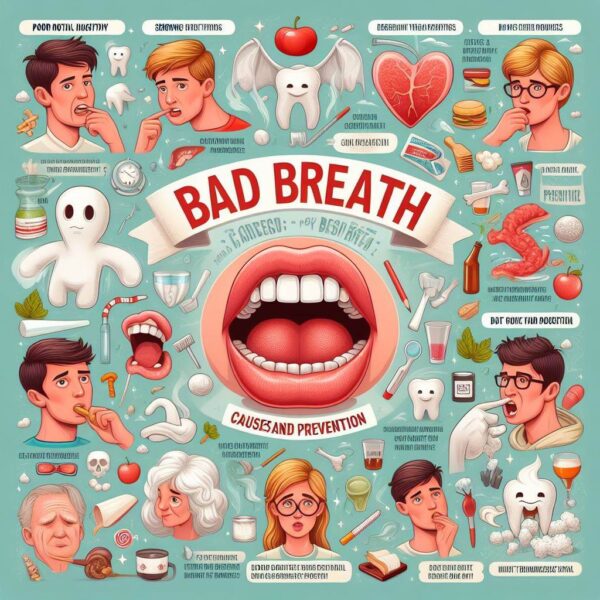
Bad breath, also known as halitosis, is a common yet often embarrassing condition that many people experience at some point in their lives. It can arise from a variety of factors, ranging from poor oral hygiene to underlying medical conditions.
Regardless of its cause, bad breath can have a significant impact on an individual’s self-esteem and social interactions. Understanding the causes and mechanisms behind bad breath is the first step toward effectively managing and preventing it.
In this article, we will delve into the intricacies of bad breath, exploring its definition, potential causes, and associated risk factors. By gaining insight into what causes bad breath and how it manifests, readers can equip themselves with the knowledge needed to address this pesky issue and regain confidence in their oral health.
Understanding Bad Breath:
Bad breath, scientifically termed halitosis, refers to an unpleasant odor emanating from the mouth when exhaling air. It can be a temporary occurrence, such as “morning breath” upon waking, or a chronic problem that persists throughout the day. The odor associated with bad breath can vary in intensity and character, ranging from mildly unpleasant to foul and offensive.
What Can Cause Bad Breath?
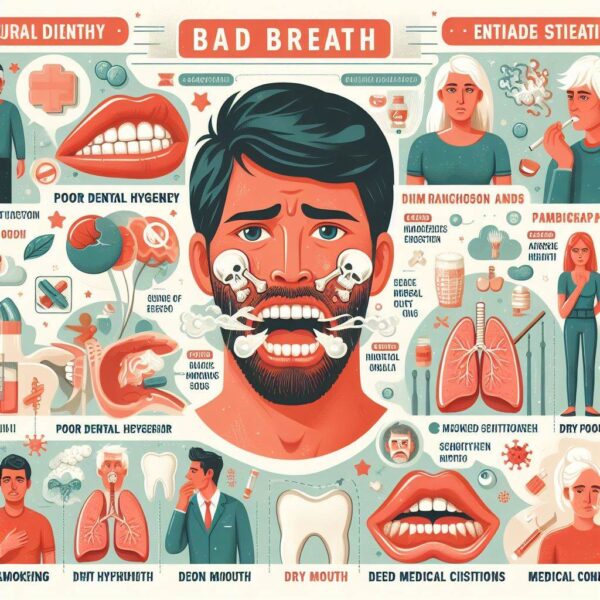
Bad breath, also known as halitosis, is a common and often distressing condition that affects millions of people worldwide. Whether it’s a temporary annoyance or a persistent issue, dealing with bad breath can be a source of embarrassment and discomfort.
Understanding the factors that contribute to bad breath is essential for effectively addressing the problem and restoring confidence in one’s oral health. In this article, we’ll explore the various causes of bad breath, ranging from poor oral hygiene to underlying medical conditions.
By shedding light on the underlying mechanisms behind halitosis, readers can gain valuable insight into how to prevent and manage this pesky problem. So, if you’ve ever wondered what might be causing your bad breath or how to tackle it head-on, read on to discover the common culprits behind this unwelcome odor.
Cause Bad Breath:
Bad breath can stem from a wide range of factors, both temporary and chronic. Understanding these causes is key to effectively combating halitosis and restoring fresh breath. Below are some of the most common culprits:
Poor Oral Hygiene:
Inadequate brushing and flossing can lead to the buildup of plaque, bacteria, and food particles in the mouth, contributing to bad breath. These oral hygiene shortcomings allow bacteria to thrive, leading to the production of foul-smelling gases.
Food and Drink:
Certain foods and beverages, such as onions, garlic, coffee, and alcohol, contain volatile compounds that can linger in the mouth and contribute to bad breath. Additionally, consuming sugary foods can fuel the growth of odor-causing bacteria.
Dry Mouth:
Saliva plays a crucial role in washing away food particles and bacteria in the mouth. When saliva production decreases, as is the case with dry mouth (xerostomia), bacteria can proliferate, leading to bad breath.
Tobacco Use:
Smoking and chewing tobacco not only leave a distinct odor on the breath but also contribute to dry mouth and gum disease, both of which can cause bad breath.
Underlying Dental Issues:
Cavities, gum disease (gingivitis or periodontitis), oral infections, and poorly fitting dental appliances can harbor bacteria and produce foul-smelling odors.
Medical Conditions:
Certain medical conditions, such as sinus infections, respiratory infections, diabetes, liver or kidney disease, and gastrointestinal disorders, can manifest as bad breath due to the release of chemicals in the breath or changes in the body’s metabolism.
Medications:
Some medications, including antihistamines, diuretics, and certain psychiatric drugs, can cause dry mouth as a side effect, leading to bad breath.
Skipping Meals:
Prolonged periods of fasting or skipping meals can result in decreased saliva production, leading to dry mouth and potentially bad breath.
Stress:
Stress can contribute to bad breath through various mechanisms, including decreased saliva production and changes in oral hygiene habits.
Genetics:
Some individuals may be genetically predisposed to certain oral conditions, such as dry mouth or gum disease, which can contribute to bad breath.
Improving Your Oral Health

Oral health is an integral part of overall well-being, yet it’s often overlooked until problems arise. From preventing cavities and gum disease to maintaining fresh breath and a confident smile, taking care of your oral health is essential for a happy and healthy life.
Fortunately, with the right habits and practices, it’s possible to improve and maintain optimal oral health throughout your lifetime. In this article, we’ll delve into the importance of oral health and provide practical tips for enhancing your dental care routine.
Whether you’re looking to prevent common issues like cavities and bad breath or seeking to achieve a brighter, healthier smile, the information provided here will guide you on your journey to better oral health. So, if you’re ready to invest in your smile and overall well-being, read on to discover how to improve your oral health and enjoy the benefits of a healthy mouth for years to come.
How To Improve The Oral Health:
Maintaining good oral health is crucial for preventing dental problems, preserving your smile, and supporting your overall health and well-being. Here are some tips for improving your oral health and achieving a brighter, healthier smile:
1. Brush and Floss Regularly:
Brush your teeth at least twice a day, using fluoride toothpaste and a soft-bristled toothbrush. Be sure to brush for two minutes each time, covering all surfaces of your teeth and along the gumline. Additionally, don’t forget to floss daily to remove plaque and food particles from between your teeth and under the gumline.
2. Use Mouthwash:
Incorporate a fluoride or antibacterial mouthwash into your oral hygiene routine to help kill bacteria, freshen your breath, and strengthen tooth enamel. Swish the mouthwash around your mouth for 30-60 seconds before spitting it out.
3. Maintain a Balanced Diet:
Limit sugary snacks and beverages, which can contribute to tooth decay, and opt for a balanced diet rich in fruits, vegetables, lean proteins, and whole grains. Drinking plenty of water throughout the day can also help rinse away food particles and bacteria.
4. Quit Smoking:
Smoking not only stains your teeth and contributes to bad breath but also increases your risk of gum disease, oral cancer, and other dental problems. If you smoke or use tobacco products, quitting is one of the best things you can do for your oral and overall health.
5. Protect Your Teeth:
Wear a mouthguard while playing contact sports to protect your teeth from injury, and use a nightguard if you grind your teeth while sleeping to prevent damage to your tooth enamel.
6. Consider Cosmetic Dentistry:
If you’re unhappy with the appearance of your smile, consider cosmetic dentistry options such as teeth whitening, dental veneers, or orthodontic treatment to improve the aesthetics of your teeth and boost your confidence.
7. Practice Good Oral Habits:
Avoid habits that can harm your oral health, such as biting your nails, chewing ice, or using your teeth as tools to open packages. These habits can chip or crack your teeth and increase your risk of dental problems.
By following these tips and prioritizing your oral health, you can improve the health and appearance of your smile and enjoy the benefits of a healthy mouth for years to come. Remember, investing in your oral health now can pay off in the form of a beautiful smile and improved overall well-being in the future.
Diagnosis For Bad Breath
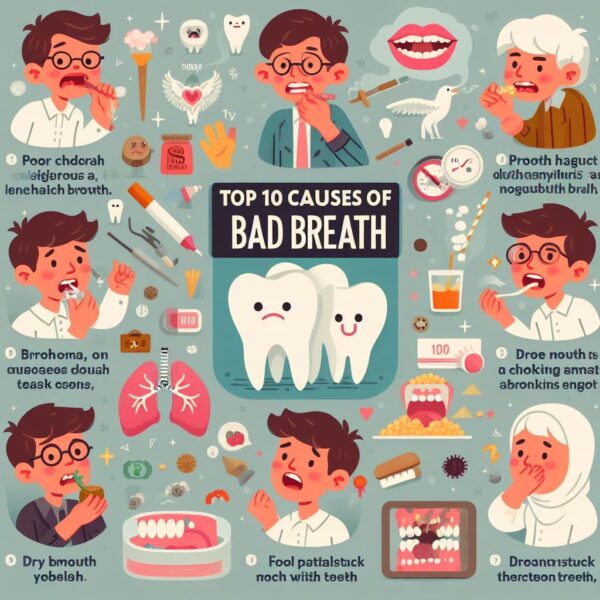
Bad breath, medically termed halitosis, is a common yet often distressing condition that can affect individuals of all ages. Whether it’s a temporary inconvenience or a persistent issue, diagnosing the underlying cause of bad breath is crucial for effective treatment and management.
Identifying the root cause of halitosis requires a comprehensive evaluation that considers various factors, ranging from oral hygiene habits to potential underlying medical conditions.
In this article, we’ll delve into the diagnostic process for bad breath, exploring the steps involved in pinpointing the factors contributing to this unwelcome odor. By understanding the diagnostic approach to halitosis, individuals can take proactive steps toward addressing the underlying causes and regaining confidence in their oral health.
So, if you’ve been struggling with bad breath and are eager to uncover the reasons behind it, read on to discover how diagnosis plays a crucial role in finding solutions for halitosis.
Diagnostic Process For Bad Breath:
Medical History Review:
The diagnostic process often begins with a comprehensive review of the individual’s medical history. This includes discussing any existing medical conditions, medications, dietary habits, and lifestyle factors that may contribute to bad breath.
Symptom Assessment:
Healthcare providers will inquire about the frequency, duration, and severity of the bad breath, as well as any accompanying symptoms such as dry mouth, gum bleeding, or throat discomfort.
Oral Examination:
A thorough oral examination is essential for identifying oral health issues that may be contributing to bad breath. This includes inspecting the teeth, gums, tongue, and throat for signs of dental decay, gum disease, oral infections, or other abnormalities.
Evaluation of Oral Hygiene Habits:
Healthcare providers will assess the individual’s oral hygiene practices, including brushing and flossing habits, frequency of dental visits, and use of oral care products. Poor oral hygiene is a common cause of bad breath and may require education and reinforcement of proper dental care techniques.
Measurement of Oral Odor:
Objective methods for measuring oral odor, such as the use of a portable sulfide monitor or altimeter, may be employed to quantify the severity of bad breath and monitor treatment effectiveness.
Assessment of Systemic Conditions:
Since bad breath can sometimes be a symptom of underlying systemic conditions, healthcare providers may conduct additional tests or refer the individual to specialists for further evaluation. This may include blood tests, imaging studies, or consultations with otolaryngologists, gastroenterologists, or other specialists as needed.
Breath Tests:
Breath tests, such as gas chromatography or oral volatile sulfur compound analysis, may be performed to identify specific compounds responsible for the malodor and determine the underlying cause.
Collaborative Approach:
Diagnosing bad breath often requires a collaborative effort between dental professionals, physicians, and other healthcare providers. By working together, they can assess all potential contributing factors and develop a personalized treatment plan tailored to the individual’s needs.
Bad Breath Treatment

Dealing with bad breath, medically known as halitosis, can be a persistent challenge that affects millions of people worldwide. Whether it’s a temporary inconvenience or a chronic issue, finding an effective treatment for bad breath is essential for restoring confidence and improving oral health.
Fortunately, a wide range of treatment options are available to address the underlying causes of halitosis, ranging from simple lifestyle changes to professional interventions. In this article, we’ll explore the various treatments for bad breath, examining the strategies and techniques used to combat this common problem.
By understanding the treatment options available, individuals can take proactive steps towards eliminating bad breath and enjoying fresh breath and improved oral health.
So, if you’re tired of feeling self-conscious about your breath and are eager to find solutions, read on to discover how to effectively treat bad breath and regain confidence in your smile.
Treatment For Bad Breath:
Treating bad breath involves addressing the underlying causes of halitosis and implementing targeted interventions to eliminate or minimize the odor. Here are some common treatment options for bad breath:
1. Improved Oral Hygiene:
One of the most effective ways to combat bad breath is by maintaining excellent oral hygiene habits. This includes brushing your teeth at least twice a day, flossing daily, and cleaning your tongue with a tongue scraper or toothbrush. Proper oral hygiene helps remove plaque, bacteria, and food particles that contribute to bad breath.
2. Regular Dental Visits:
Schedule regular dental check-ups and cleanings with your dentist or dental hygienist every six months, or as recommended. Professional cleanings help remove plaque and tartar buildup, reducing the risk of gum disease and bad breath. Your dentist can also identify and treat any underlying dental issues that may be contributing to halitosis.
3. Treatment of Dental Issues:
If dental problems such as cavities, gum disease, or oral infections are causing bad breath, they need to be addressed promptly. Depending on the severity of the issue, treatment may include fillings, deep cleanings, or antibiotics to eliminate bacteria and restore oral health.
4. Mouthwash and Rinses:
Antiseptic mouthwashes and rinses can help reduce bacteria in the mouth and freshen your breath. Look for mouthwashes containing ingredients such as chlorine dioxide, cetylpyridinium chloride, or essential oils like eucalyptol, menthol, and thymol, which have antibacterial properties.
5. Saliva Substitutes:
For individuals with dry mouth (xerostomia), saliva substitutes or artificial saliva products can help alleviate dryness and improve oral moisture, reducing the risk of bad breath associated with decreased saliva flow.
6. Dietary Changes:
Avoiding foods and beverages that contribute to bad breath, such as onions, garlic, coffee, and alcohol, can help minimize odor. Instead, opt for fresh fruits and vegetables, sugar-free gum, and water to maintain hydration and promote saliva production.
7. Smoking Cessation:
Quitting smoking and avoiding tobacco products is crucial for eliminating bad breath associated with smoking. Smoking not only causes its distinct odor but also contributes to dry mouth, gum disease, and oral cancer, all of which can lead to halitosis.
8. Treatment of Underlying Medical Conditions:
If bad breath is a symptom of an underlying medical condition such as sinusitis, respiratory infections, diabetes, or gastrointestinal disorders, appropriate medical treatment is necessary to address the root cause and alleviate halitosis.
9. Professional Breath Odor Assessment:
In cases where bad breath persists despite proper oral hygiene and lifestyle changes, a professional breath odor assessment may be recommended. This involves specialized tests and evaluations to identify specific compounds responsible for the malodor and determine the underlying cause.
Things You Can Try At Home To Eliminate Bad Breath
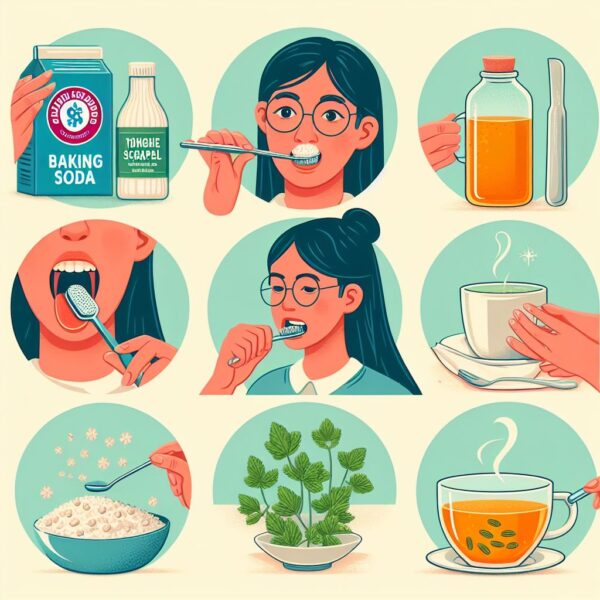
Bad breath, medically known as halitosis, can be a persistent and embarrassing problem that affects many individuals at some point in their lives. Whether it’s caused by poor oral hygiene, dietary choices, or underlying health issues, finding effective ways to eliminate bad breath is essential for restoring confidence and promoting oral health.
While professional dental care is important for addressing underlying dental problems, there are also several simple and practical steps that individuals can take at home to combat bad breath.
In this article, we’ll explore some of the things you can try at home to eliminate bad breath. From improving oral hygiene habits to making dietary adjustments and using natural remedies, these tips can help you achieve fresher breath and greater confidence in your daily interactions.
So, if you’re tired of feeling self-conscious about your breath and are looking for easy solutions, read on to discover how to banish bad breath from the comfort of your own home.
To Eliminate Bad Breath Things You Can Try At Home:
Combatting bad breath doesn’t always require complicated solutions or expensive treatments. There are several simple and effective things you can try at home to eliminate bad breath and maintain fresher breath throughout the day. Here are some tips to help you achieve fresher breath:
Improve Your Oral Hygiene Routine:
One of the most effective ways to eliminate bad breath is by maintaining excellent oral hygiene habits. Brush your teeth at least twice a day, using fluoride toothpaste and a soft-bristled toothbrush. Pay special attention to brushing your tongue, as bacteria can accumulate on its surface and contribute to bad breath. Don’t forget to floss daily to remove plaque and food particles from between your teeth and along the gumline.
Stay Hydrated:
Drinking plenty of water throughout the day can help keep your mouth moist and prevent dry mouth, which is a common cause of bad breath. Aim to drink at least eight glasses of water a day, and consider carrying a water bottle with you to stay hydrated on the go.
Chew Sugar-Free Gum or Mints:
Chewing sugar-free gum or sucking on sugar-free mints can help stimulate saliva production and freshen your breath. Look for gum or mints containing xylitol, a natural sweetener that can help inhibit the growth of bacteria in the mouth.
Use Mouthwash:
Incorporate an antibacterial or fluoride mouthwash into your oral hygiene routine to help kill bacteria and freshen your breath. Swish the mouthwash around your mouth for 30-60 seconds before spitting it out. Be sure to choose a mouthwash that is alcohol-free to avoid drying out your mouth.
Scrape Your Tongue:
Use a tongue scraper or the back of your toothbrush to gently scrape your tongue and remove bacteria and debris that can contribute to bad breath. Start at the back of your tongue and work your way forward, rinsing the scraper or toothbrush after each pass.
Watch Your Diet:
Certain foods and beverages, such as onions, garlic, coffee, and alcohol, can contribute to bad breath. Limiting your consumption of these items or practicing good oral hygiene immediately after consuming them can help minimize their effects on your breath. Instead, opt for fresh fruits and vegetables, which can help neutralize odors in the mouth.
Avoid Smoking and Tobacco Products:
Smoking and using tobacco products not only leave a distinct odor on your breath but also contribute to dry mouth, gum disease, and oral cancer, all of which can lead to bad breath. Quitting smoking is one of the best things you can do for your oral and overall health.
Try Natural Remedies:
Some natural remedies, such as chewing on fresh herbs like parsley, mint, or cilantro, or rinsing with a solution of baking soda and water, can help neutralize odors in the mouth and freshen your breath.
Keep Your Toothbrush Clean:
Rinse your toothbrush thoroughly after each use and allow it to air dry. Replace your toothbrush every three to four months, or sooner if the bristles become frayed or worn.
Manage Stress:
Stress can contribute to bad breath through various mechanisms, including decreased saliva production and changes in oral hygiene habits. Practice stress-reduction techniques such as deep breathing, meditation, or yoga to help alleviate stress and improve your overall well-being.
Home Remedies For Bad Breath

Bad breath, or halitosis, can be an uncomfortable and embarrassing issue that affects many individuals at some point in their lives. While maintaining good oral hygiene and seeking professional dental care are essential for combating bad breath, there are also several simple and natural remedies that you can try at home to freshen your breath and improve your oral health.
From using common kitchen ingredients to practicing good oral hygiene habits, these home remedies offer convenient and cost-effective solutions for banishing bad breath. In this article, we’ll explore some effective home remedies for bad breath that you can incorporate into your daily routine.
Whether you’re dealing with occasional bad breath or chronic halitosis, these natural remedies can help you achieve fresher breath and greater confidence in your interactions with others.
So, if you’re looking for easy and natural ways to tackle bad breath, read on to discover how to freshen your breath using ingredients you may already have at home.
Some Effective Home Remedies for Bad Breath:
When it comes to combating bad breath, you don’t always need to rely on commercial mouthwashes or breath fresheners. There are several simple and natural remedies that you can try at home to freshen your breath and improve your oral health. Here are some effective home remedies for bad breath:
1. Drink Water:
Staying hydrated is crucial for maintaining good oral health and preventing dry mouth, which can contribute to bad breath. Drink plenty of water throughout the day to help rinse away food particles and bacteria in your mouth.
2. Chew Sugar-Free Gum:
Chewing sugar-free gum can help stimulate saliva production, which can help wash away food particles and bacteria that cause bad breath. Look for gum containing xylitol, a natural sweetener that can help inhibit the growth of bacteria in the mouth.
3. Use Baking Soda:
Baking soda, also known as sodium bicarbonate, has natural deodorizing properties that can help neutralize odors in the mouth. Mix a teaspoon of baking soda in a glass of water and use it as a mouthwash to freshen your breath.
4. Try Oil Pulling:
Oil pulling is an ancient Ayurvedic practice that involves swishing oil around in your mouth to remove bacteria and toxins. Coconut oil is commonly used for oil pulling due to its antimicrobial properties. Swish a tablespoon of coconut oil around in your mouth for 15-20 minutes, then spit it out and rinse your mouth with water.
5. Drink Green Tea:
Green tea contains compounds called catechins that have antibacterial properties and can help reduce bad breath. Drink a cup of green tea after meals to help freshen your breath and improve your oral health.
6. Eat Crunchy Fruits and Vegetables:
Crunchy fruits and vegetables, such as apples, carrots, and celery, can help scrub away plaque and bacteria from your teeth and gums, reducing the risk of bad breath. Snack on these foods between meals to keep your breath fresh.
7. Gargle with Salt Water:
Gargling with salt water can help kill bacteria in your mouth and throat, reducing bad breath. Dissolve half a teaspoon of salt in a glass of warm water and gargle with it for 30 seconds to a minute before spitting it out.
8. Use Herbal Mouthwashes:
Herbal mouthwashes made with ingredients like mint, parsley, and clove can help freshen your breath and kill bacteria in your mouth. Look for natural mouthwash products at your local health food store or make your own using fresh herbs and water.
9. Chew Fresh Herbs:
Chewing on fresh herbs like parsley, mint, or cilantro can help neutralize odors in your mouth and freshen your breath. Keep a small bunch of herbs on hand and chew on a few leaves after meals to keep your breath fresh.
10. Maintain Good Oral Hygiene:
Practicing good oral hygiene habits is essential for preventing bad breath. Brush your teeth at least twice a day, floss daily, and clean your tongue with a tongue scraper to remove bacteria and food particles that can cause bad breath.
Homemade Mouthwash With Baking Soda
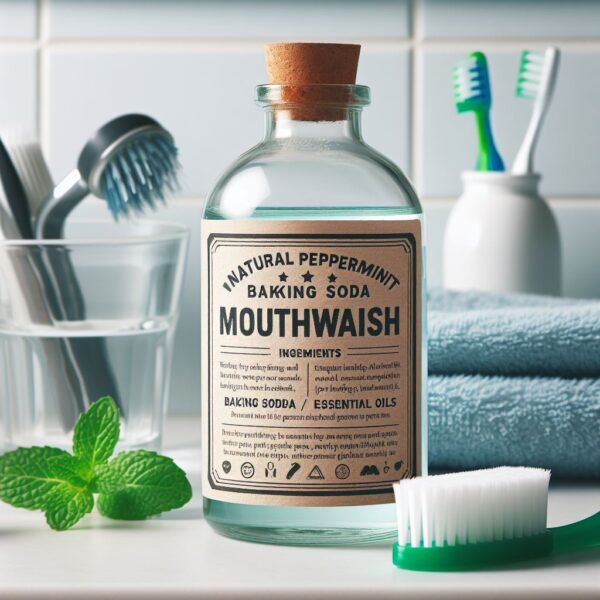
Dealing with bad breath, also known as halitosis, can be a persistent and uncomfortable issue that affects many individuals at various points in their lives. While professional dental care and commercial products are commonly relied upon for combating bad breath, there are numerous natural and simple remedies that can be tried at home.
These home remedies offer convenient and often cost-effective solutions for freshening breath and promoting oral health. Whether it’s occasional bad breath or chronic halitosis, these natural remedies can provide relief and restore confidence in social interactions.
In this article, we’ll explore alternative home remedies for bad breath that individuals can easily incorporate into their daily routines. By diversifying the approaches to tackling bad breath, individuals can find what works best for them and achieve lasting freshness in their breath without relying solely on commercial products.
Alternative Home Remedies for Bad Breath:
When traditional methods fall short or individuals prefer natural alternatives, there are several unconventional home remedies for combating bad breath. Here are some alternative approaches to freshening breath:
1. Apple Cider Vinegar Rinse:
Apple cider vinegar has natural antibacterial properties that can help kill odor-causing bacteria in the mouth. Mix a tablespoon of apple cider vinegar with a cup of water and use it as a mouth rinse to freshen your breath.
2. Chew Cardamom Seeds:
Cardamom seeds have a pleasant aroma and can help mask bad breath. Chew on a few cardamom seeds after meals to freshen your breath naturally.
3. Drink Herbal Teas:
Herbal teas such as peppermint, chamomile, and fennel can help freshen your breath and soothe the digestive system. Drink a cup of herbal tea after meals to promote oral health and reduce bad breath.
4. Consume Probiotic Foods:
Probiotic foods such as yogurt, kefir, and kimchi contain beneficial bacteria that can help balance the oral microbiome and reduce bad breath. Incorporate probiotic-rich foods into your diet to promote oral health from the inside out.
5. Use Activated Charcoal:
Activated charcoal has adsorbent properties that can help absorb toxins and odors in the mouth. Brush your teeth with activated charcoal powder or use charcoal-infused toothpaste to freshen your breath naturally.
6. Gargle with Hydrogen Peroxide:
Hydrogen peroxide is a natural disinfectant that can help kill bacteria in the mouth and reduce bad breath. Mix equal parts hydrogen peroxide and water, gargle with the solution for 30 seconds, then spit it out and rinse your mouth with water.
7. Consume Citrus Fruits:
Citrus fruits such as oranges, lemons, and grapefruits contain citric acid, which can help stimulate saliva production and freshen breath. Snack on citrus fruits between meals to keep your breath fresh throughout the day.
8. Try Oil Pulling with Sesame Oil:
Oil pulling with sesame oil is an ancient Ayurvedic practice that can help remove toxins and bacteria from the mouth. Swish a tablespoon of sesame oil around in your mouth for 15-20 minutes, then spit it out and rinse your mouth with water.
9. Chew Cloves or Anise Seeds:
Cloves and anise seeds have natural antibacterial properties and a pleasant aroma that can help freshen breath. Chew on a few cloves or anise seeds after meals to eliminate bad breath.
10. Rinse with Aloe Vera Juice:
Aloe vera juice has soothing and antibacterial properties that can help reduce inflammation and kill bacteria in the mouth. Rinse your mouth with aloe vera juice after brushing to freshen your breath naturally.
How Does Food Affect Breath?
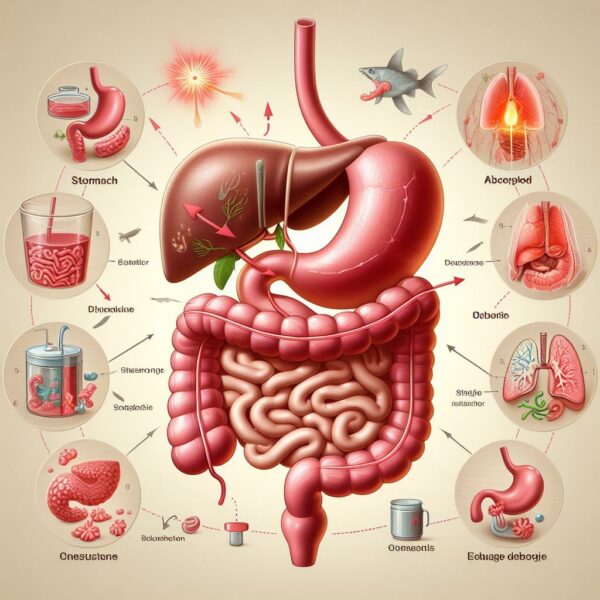
Have you ever noticed how certain foods can leave a lasting impression on your breath? From the unmistakable scent of garlic and onions to the refreshing aroma of mint, the foods we consume can have a significant impact on the freshness of our breath.
Understanding how food affects breath is essential for maintaining confidence in social interactions and promoting oral health. While some foods can contribute to bad breath by releasing pungent compounds or promoting bacterial growth in the mouth, others can help freshen breath and promote oral hygiene.
In this article, we’ll explore the fascinating relationship between food and breath, examining how different foods can influence the odor and freshness of your breath. By gaining insight into how food affects breath, you can make informed dietary choices to ensure fresher breath and greater confidence in your daily interactions.
Food Affects Breath:
The relationship between food and breath is complex and multifaceted, with various factors influencing the odor and freshness of your breath. Here’s how different foods can affect your breath:
Garlic and Onions:
Garlic and onions contain sulfur compounds that are released when they are chopped, crushed, or chewed. These compounds can be absorbed into the bloodstream and transferred to the lungs, where they are exhaled, resulting in a foul-smelling breath that can linger for hours.
Spicy Foods:
Spicy foods containing ingredients like chili peppers and curry can stimulate the production of saliva and increase blood flow to the mouth, leading to temporary bad breath. Additionally, spicy foods can cause stomach acid to reflux into the esophagus, contributing to halitosis.
Dairy Products:
Dairy products such as milk, cheese, and yogurt can promote the production of bacteria in the mouth, leading to the formation of volatile sulfur compounds (VSCs) that contribute to bad breath. Lactose intolerance can also cause bad breath in some individuals.
Coffee and Alcohol:
Coffee and alcohol can cause dehydration, leading to dry mouth, a common cause of bad breath. Additionally, the acidic nature of coffee and the fermentation process involved in alcohol production can contribute to halitosis.
Sugar and Carbohydrates:
Sugary foods and carbohydrates can fuel the growth of bacteria in the mouth, leading to the production of acids and VSCs that contribute to bad breath. Limiting your consumption of sugary snacks and beverages can help reduce the risk of halitosis.
Acidic Foods:
Acidic foods such as citrus fruits, tomatoes, and vinegar can erode tooth enamel and irritate the gums, leading to bad breath. Additionally, the acidic nature of these foods can create an environment conducive to bacterial growth in the mouth.
High-Protein Foods:
High-protein foods such as meat, fish, and eggs can produce sulfur-containing compounds during digestion, which can contribute to bad breath. These compounds are released when proteins break down in the digestive system and are eventually exhaled through the breath.
Fiber-Rich Foods:
Fiber-rich foods such as fruits, vegetables, and whole grains can help promote saliva production and improve digestion, reducing the risk of bad breath. Additionally, the chewing action required to eat fibrous foods can help remove plaque and food particles from the teeth and gums.
Fresh Herbs and Spices:
Fresh herbs and spices such as parsley, mint, and cinnamon contain natural antibacterial properties that can help freshen breath and promote oral hygiene. Chewing on fresh herbs or spices after meals can help neutralize odors in the mouth and promote fresher breath.
Water-Rich Foods:
Water-rich foods such as cucumbers, watermelon, and celery can help hydrate the body and promote saliva production, reducing the risk of dry mouth and bad breath. Snacking on these foods between meals can help keep your breath fresh throughout the day.
Why Do Poor Habits Cause Bad Breath?
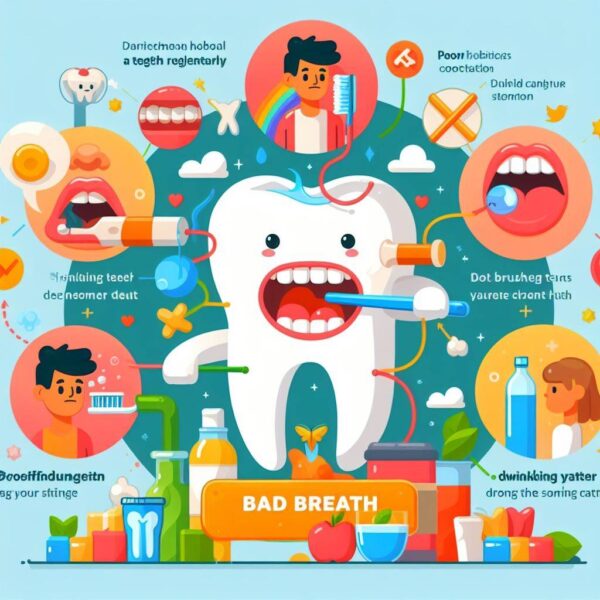
Ever wondered why certain behaviors lead to persistent bad breath? Whether it’s neglecting oral care routines, tobacco use, or consuming certain foods, poor habits can significantly affect the freshness of one’s breath.
Understanding the mechanisms behind why these habits cause bad breath is pivotal for addressing the root causes of halitosis and fostering better oral health. Bad breath, often serving as an uncomfortable indicator of underlying issues, underscores the importance of proactive oral hygiene.
In this article, we’ll delve into the reasons why poor habits contribute to bad breath, examining the diverse factors that culminate in halitosis. By gaining insight into the intricate interplay between habits and bad breath, individuals can embark on a journey to eradicate these detrimental practices and cultivate fresher breath, ultimately boosting confidence in their daily interactions.
Reasons Why Poor Habits Contribute To Bad Breath:
Poor habits can wield a profound influence on breath quality, manifesting as halitosis and potentially leading to oral health complications. The ramifications of these habits are multifaceted, woven into the fabric of daily routines and behaviors.
Neglecting oral hygiene, for instance, fosters an environment ripe for bacterial proliferation within the oral cavity. Insufficient brushing and flossing permit the accumulation of food remnants and plaque, inciting gum disease and emanating foul odors.
Similarly, dry mouth, induced by mouth breathing, dehydration, or medications, exacerbates bad breath by impeding saliva’s natural cleansing and antibacterial functions.
Conclusion:
Banishing bad breath is not only about masking odors but addressing underlying causes and adopting healthy oral hygiene habits. By understanding the factors contributing to halitosis and implementing effective strategies, individuals can achieve lasting freshness and confidence in their breath.
Whether it’s improving oral hygiene routines, addressing dietary choices, or seeking professional dental care, taking proactive steps is key to eliminating bad breath and promoting overall oral health. With persistence and dedication, anyone can enjoy the benefits of fresh breath and enhanced self-assurance in social interactions.
FAQs:
Q1. How often should I brush my teeth to get rid of bad breath?
A: It’s recommended to brush your teeth at least twice a day, ideally after meals, using fluoride toothpaste and a soft-bristled toothbrush. Additionally, don’t forget to clean your tongue and floss daily to remove plaque and bacteria that contribute to bad breath.
Q2. Can drinking more water help eliminate bad breath?
A: Yes, staying hydrated by drinking plenty of water throughout the day can help prevent dry mouth, which is a common cause of bad breath. Water helps rinse away food particles and bacteria in the mouth, promoting fresher breath.
Q3. Are there specific foods I should avoid to reduce bad breath?
A: Certain foods and beverages, such as onions, garlic, spicy foods, and coffee, can contribute to bad breath due to their strong odors and ability to promote bacterial growth in the mouth. Limiting your consumption of these items or practicing good oral hygiene after consuming them can help minimize their effects on your breath.
Q4. Is using mouthwash effective in getting rid of bad breath?
A: Mouthwash can be effective in temporarily freshening breath and reducing bacteria in the mouth. Look for mouthwashes containing antibacterial ingredients like chlorhexidine, cetylpyridinium chloride, or essential oils. However, it’s essential to remember that mouthwash is not a substitute for proper oral hygiene practices like brushing and flossing.
Q5. When should I see a dentist about my bad breath?
A: If bad breath persists despite improved oral hygiene habits and lifestyle changes, or if it’s accompanied by other symptoms such as gum inflammation, tooth pain, or dry mouth, it’s advisable to schedule a dental appointment.
Your dentist can assess your oral health, identify any underlying issues contributing to bad breath, and recommend appropriate treatment options.

Find a natural alternative method to reverse different diseases and STDs no matter what science says about their illness. I am sharing my healing encounter from genital herpes after using Dr okosun herbal medicine to cure my HSV-1&2 diagnosis permanently. A few weeks ago my new lab result shows that I tested negative. I am so happy I gave it a try. Currently, my 65 years old mom is using Dr okosun herbs to eliminate her diabetes and the recovery process is amazing. I am recommending this product for those that are willing to give it a try as these holistic remedies do not have any side effects. drokosun55@gmail. com